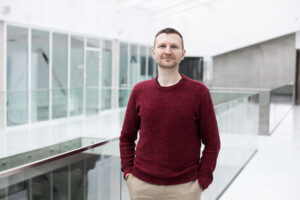The voice is a medium we use to successfully interact with the outside world. Unfortunately, most people’s voices change or even disappear after a laryngectomy. To improve these patients’ quality of life, a team of researchers from the universities in Kaunas, Lithuania invented a new substitute voice evaluation index – it will detect pathologies in patients’ voices faster and better.
Removal of the larynx – a laryngectomy, usually performed for advanced laryngeal cancer, dramatically changes the voice, which greatly alters the patient’s normal life. Researcher of Kaunas University of Technology Faculty of Informatics (KTU IF) Rytis says that the change in voice after laryngectomy depends on the severity of the situation: “For some, the voice changes only slightly, while for others, it can be a life-changing situation. Imagine calling someone on the phone, emergency services, police, etc. – and the one you’re calling does not understand anything. Or even not hear you – as the phone’s noise removal system will cut it out”.

“These types of surgeries require the removal of one or both vocal folds, part or even the entire larynx to remove a malignant laryngeal tumour. As a result, after oncological laryngeal surgery, the voice is extracted using only the laryngeal structures left after the operation, which are physiologically not intended for this – we call such a voice a “substitute voice,” says professor Virgilijus Ulozas professor at the Lithuanian University of Health Sciences (LSMU). He emphasises that the quality of voice and speech deteriorates after such an operation, complicating the patients’ communication possibilities and quality of life.
Recently, researchers from KTU and LSMU published a study in which, with the help of artificial intelligence (AI) signal processing, it was possible to determine whether a patient has certain voice pathologies.
According to Maskeliūnas, the idea to study and determine the voice quality of patients after laryngectomy came from a medical team led by an expert in this field, Prof Ulozas. To facilitate and automate the post-operative process, the KTU researchers used AI technologies, which allowed them to conditionally replace an expert doctor, a very positive result evaluated in the clinical study.
“Usually, the doctor analyses the voice and provides an index of the impairment; patients themselves also fill out a questionnaire on how they perceive the quality of the voice. Voice signal energy, formants, and other parameters are also used when performing digital signal analysis,” says Maskeliūnas.
According to him, this study is unique: “Previous studies have never successfully used artificial intelligence as an expert assistant in voice analysis”.
According to the scientist, due to this innovation, the process after surgery becomes automatised, which allows the installation of automated screening solutions, making it easier for doctors to follow and record the course of the disease and establish diagnoses.

During the research, the KTU and LSMU research team is glad to announce a discovery – the Acoustic Substitution Voice Index (ASVI), which will allow scientists to quantitatively measure and evaluate the patient’s “substitute” voice after oncological laryngitis using acoustic parameters of the voice signal and artificial intelligence methods.
“Until now, in medical practice, there was no suitable method to objectively and quantitatively evaluate the “substitute” voice. Our proposed ASVI algorithm allows the evaluation process to be done automatically in a concise time,” says Prof Ulozas.
He also believes that this discovery would allow the patient to perform a voice test at home or in a non-specialised medical institution if negative changes in the voice are noticed early. On the other hand, the professor emphasises that good ASVI indicators, in the absence of other complaints, would allow patients to avoid unnecessary visits to medical professionals.
The first clinical trials of the ASVI are also very optimistic. A further goal of the researchers is to develop a convenient, clinically acceptable prototype to measure ASVI in a real clinical setting. For example, it could be a mobile app available both to specialists and patients.
In the future, such automation of diagnosis will open up new possibilities. To determine the acoustic index of the “substitute” voice it will be enough to have a smartphone or any other device with an internet connection with you. After uploading an audio recording or just by talking, changes in the voice will be analysed, the system will show an estimate, based on which the further course of treatment will be decided.
The paper on the above-described study “An Artificial Intelligence-Based Algorithm for the Assessment of Substitution Voicing” was published in MDPI “Applied Sciences” on September 28, 2022, and can be accessed here.